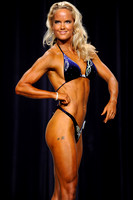 SNI: If there is ONE dietary strategy that you could implement in a novice fitness/health enthusiast, what would it be and why?
SNI: If there is ONE dietary strategy that you could implement in a novice fitness/health enthusiast, what would it be and why?
Ashleigh: Well, to sneak 2 strategies into one  I’d say increase protein intake while decreasing intake of processed carbohydrates (cereal, breads, baked goods, wheat products, etc). The food journals I review from clients consistently show very low protein intake, and very high intake of the processed carbohydrates mentioned. Not surprisingly, he clients recording this type of intake are, initially, over-fat, out of energy, with less than stellar blood work. This strategy works well for several reasons: 1. increasing protein intake helps create a more efficient metabolism (via the higher thermic effect of protein), in addition to building a stronger immune system. 2. Blood sugar levels are controlled far better when processed carbohydrates are reduced, and controlled blood sugar levels allow your body to begin the fat-loss process.
I’d say increase protein intake while decreasing intake of processed carbohydrates (cereal, breads, baked goods, wheat products, etc). The food journals I review from clients consistently show very low protein intake, and very high intake of the processed carbohydrates mentioned. Not surprisingly, he clients recording this type of intake are, initially, over-fat, out of energy, with less than stellar blood work. This strategy works well for several reasons: 1. increasing protein intake helps create a more efficient metabolism (via the higher thermic effect of protein), in addition to building a stronger immune system. 2. Blood sugar levels are controlled far better when processed carbohydrates are reduced, and controlled blood sugar levels allow your body to begin the fat-loss process.
SNI: What are your favorite exercises for developing the biggest muscle of all, the gluteus maximus!?
Ashleigh: My experience here is the execution of exercises is as important as the exercises chosen. In other words, most people haven’t been taught how to activate their glutes in lower body lifts. For example, many people try lunging and squatting their way to a firm behind, but when cued to use their glutes, they can’t feel anything. They are quad dominant, butt-less wonders (Dr. Buchberger’s coined term!). Furthermore, hip dominant lifts such as deadlifts, stiff leg deadlifts, and variations of these do not seem to be taught well anymore. Thus, between no glute activation in lower body lifts, lack of hip dominant lifts and a tendency towards quad dominance, you end up with no behind. So, to answer the question, my favorite exercises for developing nice perky glutes are proper gluteal activation patterns when deadlifting or using variations, and in all quad dominant lifts.
SNI: What is the most common mistake folks make when it comes to diet and/or training? As a personal trainer, how do you educate your clients regarding these mistakes?
Ashleigh: The most common dietary mistake people make is lack of food preparation and planning, which leads to empty refrigerators and take out. People know what to eat, they just don’t have systems in place at home to make it happen day after day. I learned these strategies from John Berardi and Carter Schoffer many years ago. As far as training mistakes, I’d say the same. Folks often times wander around the gym without a plan, without recording anything, and end up training the same way month in month out. As a trainer, I work with clients to assist them with appropriate food preparation/planning strategies, in addition to assisting them with program design so they learn their training programs well.
SNI: How do you eat (i.e. clean, dirty, McDonalds on Sundays, etc.) most of the time and what’s your favorite cheat dish/meal/snack?
Ashleigh: Lots of meat and seafood of all kinds, eggs, varied fat sources (olive oil, avocado, coconut oil) tons of veggies (all kinds of greens, and all kinds of colored veggies), yams and squash, and certain training supplements depending on the training phase. I don’t do the McDonald’s deal or dirty eating really at all, because it doesn’t feel good at all! Once weekly, I have a nice re-feed day which consists of tons of the above mentioned foods.
SNI: Last but not least, give us your top 5 favorite foods that we should all eat.
Ashleigh: Here ya go!
1. Eggs
2. Meat and seafood
3. Green veggies
4. Fish oil (I kind of think of fish oil as a food now rather than a supplement, as it’s so important)
5. Coconut oil
With a lifetime of experience in sports and training, Ashleigh possesses the knowledge, ability and passion required to create a positive transformation in the bodies and minds of her clients. Her extensive credentials include certifications as a Sports Performance Nutrition Advisor, Certified Sports Nutritionist through The International Society of Sports Nutrition (CISSN), and as a Certified Strength and Conditioning Specialist (CSCS). She is aMedical Exercise Specialist (MES), and is currently pursuing a master’s degree in human nutrition through The University of Bridgeport. Ashleigh graduated from the University of Victoria in 2003, where she earned a BSc, studying psychology and kinesiology. Ashleigh is also a graduate of the National Coaching Institute, having completed extensive sports science modules in the long-term physical preparation of the elite athlete.



